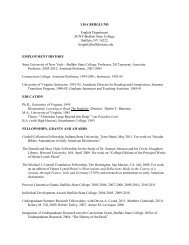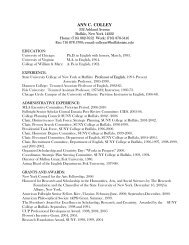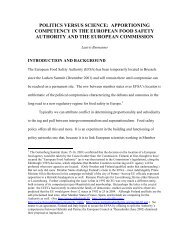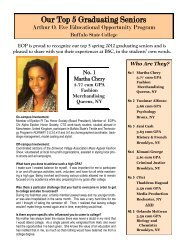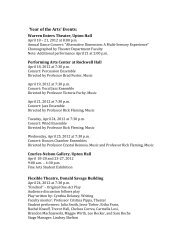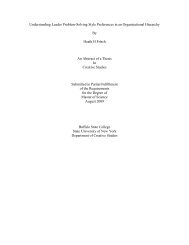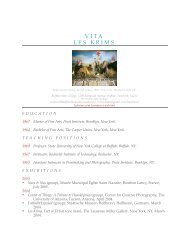Arts - Buffalo State College
Arts - Buffalo State College
Arts - Buffalo State College
You also want an ePaper? Increase the reach of your titles
YUMPU automatically turns print PDFs into web optimized ePapers that Google loves.
which found that students perceived family and the workplace as<br />
more supportive towards their academic success than the college.<br />
The results of the earlier study were based mainly on qualitative<br />
data obtained from focus groups. The current research will be a<br />
quantitative study that through the use of survey questionnaires will<br />
attempt to confirm the earlier findings. A review of the literature was<br />
conducted to develop the questionnaire used and includes measures<br />
of family, workplace and college support and stress. In addition,<br />
participants identify the degree of attachment they have to the school<br />
in terms of satisfaction with the college, their department and overall<br />
educational experience. Results are discusses in terms of how such<br />
information can be used to enhance students’ perceptions and<br />
educational experiences.<br />
Presentation Type and Session: Poster II<br />
To Capture Your Mind and Tell Their<br />
Story: Captivity Narratives<br />
Adam Bardol, ANT 499: Advance Indigenous Studies<br />
Faculty Mentor: Professor Lisa Anselmi, Anthropology<br />
In nearly all Native American histories there have been captivity<br />
stories of white women. We often hear of “brutes capturing,<br />
torturing, raping, and killing” these women and the crusades which<br />
were undertaken to rescue said women. This is often half the story.<br />
The Native American accounts often differ. There are several stories<br />
where the captive is returned to white society and the stories are true<br />
in part, but life was not as horrible as it seems (or was recounted).<br />
I intend to look into the captivities of Olive Oatman, Cynthia Ann<br />
Parker, Mary Jemison, and Pocahontas. I will look into their<br />
individual captivities and compare their stories. Olive Oatman and<br />
Cynthia Ann Parker were captured in Western North America, and<br />
Mary Jemison and Pocahontas in Eastern North America. This will<br />
give me a good geographical division point. Also in contrast is the<br />
fact that Oatman, Parker and Jemison were European-Americans<br />
while Pocahontas was an Indigenous woman. I will be using captivity<br />
narratives read in my class, ANT 499 Advanced Indigenous Studies,<br />
and several others to facilitate my research.<br />
Presentation Type and Session: Poster I<br />
Until Irreconcilable Differences Do Us<br />
Part: How Divorce Affects Adult Offspring<br />
Kira Bruce, Psychology<br />
Faculty Mentor: Professor Jill Norvilitis, Psychology<br />
Divorce in our culture is a common practice. Although most<br />
children are resilient to the effects of divorce, there are still many<br />
who suffer psychological damage that is often left unresolved<br />
(Laumann-Billings and Emery, 2000). This study aims to explore the<br />
long-term detrimental effects of divorce that are often overlooked as<br />
children grow older, specifically concerning college-aged children<br />
and their intimate relationships. Hypotheses are as follows: H1:<br />
When given descriptions of potential love interests, college students<br />
Psychology and Social Sciences<br />
will perceive the option whose parents are not divorced as a more<br />
suitable partner than an option whose parents are divorced to<br />
examine whether divorce is stigmatizing to the offspring. H2: Within<br />
a divorce, children will be more affected by the absence of a mother<br />
than the absence of a father. H3: Although college students with<br />
divorced parents may not have problems pursuing relationships in<br />
general, they will be more hesitant to pursue marriage specifically<br />
and are likely to have less faith in marriage. H4: <strong>College</strong> students will<br />
be more affected by a divorce that occurs during middle childhood<br />
compared to a divorce that occurs when a child is older with the<br />
capabilities of understanding, or occurs when a child is younger<br />
and not able to recall any conflict. H5: <strong>College</strong> students of divorced<br />
parents will be less trusting and intimate in relationships than those<br />
whose families stayed intact. Data are currently being collected<br />
and results will be presented at the Student Research and Creativity<br />
Celebration.<br />
Presentation Type and Session: Poster VI<br />
What’s Your Problem? Students’<br />
Experiences With Incivility At School and<br />
Work<br />
Salome Tsige, Psychology<br />
Faculty Mentor: Professor Robert Delprino, Psychology<br />
Recently there has been a good deal of attention given to<br />
bullying behaviors in school settings. Unfortunately bullying is not<br />
a new phenomenon and continues to persist in schools and also in<br />
workplaces. An equally important concern that deserves attention<br />
is incivility in educational and employment settings. Often it is a<br />
precursor to bullying behavior. Incivility is marked by a lack of<br />
regard for others and can be defined as any action that goes against<br />
the established norms of an environment. This includes any action<br />
that interferes with the learning or working experience. This current<br />
study will examine the types of incivilities that students face in<br />
college and at their workplace. It will also examine the affect that<br />
the experienced behaviors have on their feelings towards school<br />
and their job. This study also distinguishes what specific behaviors<br />
students experience and from whom (other students, instructors,<br />
college staff). The study of Incivility is important due to the negative<br />
effects with which it is associated. Awareness of the forms of incivility<br />
that may be occurring and from where such behaviors are coming<br />
will allow such issues to be better addressed.<br />
Presentation Type and Session: Poster I<br />
White Savages: The Portrayal of European<br />
Women In Captivity Narratives<br />
Annie Connors, ANT 499: Advanced Indigenous Studies<br />
Faculty Mentor: Professor Lisa Anselmi, Anthropology<br />
Captivity narratives are a genre of literature devoted to telling<br />
the story of people held captive by Native Americans. These stories<br />
popularly center on women of European descent and define what<br />
123




